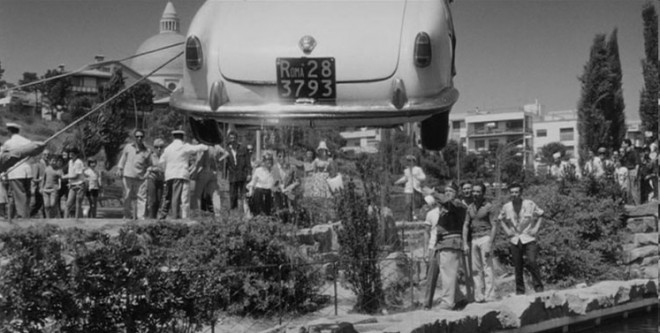The first Welsh film nominated for a foreign-language Oscar, Hedd Wyn is nearly as good as the best fictional U.S. war films, John Ford’s They Were Expendable (1945) and Sam Fuller’s The Big Red One (1980). Hollywood, of course, has scarcely enhanced the genre. Lewis Milestone’s All Quiet on the Western Front (1930), studied and lame, is a near travesty of Erich Maria Remarque’s terrific novel, replacing the latter’s antiwar arguments with (however sincere) antiwar sentiment. Oliver Stone’s Platoon (1986)—which like All Quiet the industry threw its top prize at—succeeds merely in rendering a combat environment; but its melodramatic reduction of Herman Melville’s vast, profound, complex masterpiece Moby-Dick is grotesque and laughable. (This idea of wedging into a war film a great book comes from Francis Ford Coppola’s grandiose Apocalypse Now, 1979, which river-journeys into Joseph Conrad’s Heart of Darkness.) More recently, Terrence Malick’s surreal swoon in The Thin Red Line surpasses, the same year, Steven Spielberg’s mess of unimaginative literalism and narrational chicanery in Saving Private Ryan (1998), an especially weak war film for all its publicity.
Hedd Wyn is probably a better film than all these except for the Ford and the Fuller. But it falls far short of the great war films, among them, Aleksandr Dovzhenko’s Arsenal (1929) and Sergei M. Eisenstein’s Aleksandr Nevsky (1938), Jean Renoir’s La grande illusion (1937) and Jean-Luc Godard’s Les carabinièrs (1963), Kenji Mizoguchi’s Ugetsu (1953), Akira Kurosawa’s Seven Samurai (1954), Kon Ichikawa’s The Burmese Harp (1956) and Fires on the Plain (1959), Andrzej Munk’s Eroica (1957) and Emir Kusturica’s Underground (1995), and so on. Indeed, the Welsh film, directed by Paul Turner, falls a tad short also of the Australian film it more than passingly resembles: Peter Weir’s powerful Gallipoli (1981).
And why shouldn’t Turner use as a model Weir’s haunting lament for war-wasted youth? (He may have been ill advised, though, to borrow the idea of his framing narrative from Hugh Hudson’s Chariots of Fire, 1981.) For in both these films the subject is the Great War; and in both of them the highly reluctant “enlistee” is British without being English—one, an Australian of Irish descent; the other, a Welshman. Indeed, each film reveals conflict between the English and the appropriated soul they disdain. Finally, both films in leisurely fashion present a fairly complex social landscape prefatory to the young man’s immersion in front-line battle—a conventional structure, actually, given new life by Michael Cimino’s admirable The Deer Hunter (1978), which may have had a hand in the narrative tack taken by Gallipoli.
However, the two characters themselves are far from similar. Frank Dunne, in Gallipoli, is self-uncertain and anxious; his counterpart here is cool and centered. Dunne is a runner; Ellis Ewans—Hedd Wyn is a nom de plume—is a poet.
The war cuts short Ewans’s life just as he is about to gain recognition in Wales for his prize-winning poem about war’s awfulness. Yet somehow this isn’t as throat-tighteningly sad and stirring as Frank Dunne’s frantic finish where, as communications-runner for his battalion, he just misses passing along an order that would have spared the lives of his comrades, whom enemy fire mows down. Because of Weir’s passionate filmmaking, and because Mel Gibson’s acting is so quick and urgent (it has since slowed to a snail’s pace), Gallipoli is far more apt to leave one shaken and limp. Truth is, although based on an actual life (and death) and, like Gallipoli, actual events, Hedd Wyn seems much more remote.
Moreover, the film makes an incalulable error. It posits Ewans’s poetic gift as a significant thing, his reason for being which war takes away from both him and his nation; yet his poetry scarcely is heard or seen in the film. This discrepancy undermines the film’s clarity and conviction; for Turner’s theme to persuade, Ewans’s poetry should appear generously, at least at the edges of the film. (Three years hence Agnieszka Holland would make the same mistake—only worse, because the two poets involved are brilliant ones, Arthur Rimbaud and Paul Verlaine—in Total Eclipse, 1995, although her more deadly mistake may have been to cast dishwater-dull Leonardo DiCaprio as Rimbaud.)
For all this, though, this is an uncommonly good war film, especially for one from somewhere else than the Soviet Union, Japan, France, Poland, and the Balkans. I like the narrative device of the soldier’s delirious flashbacks once he is fallen on the battlefield; it reinforces the film’s theme that, his future canceled, Ewans “relives” his past as a way of clinging to each drop of life. But by far the the film’s high point is the battlefield trudging passage where the flashing of different colors—throughout the film, Ray Orton’s color lensing, put to both naturalistic and, as here, expressionistic use, is gorgeous—grippingly evokes the strangeness and unnaturalness of the mental landscape soldiers are plunged into. I am less persuaded, though, by the film’s recurrent dabs of Celtic mysticism. However, I wouldn’t have expunged this material; I would have expanded it, making it a more integrated element in the film—not merely as a way of prefiguring Ewans’s fate, but as a means of revealing an ancient, vibrant source of his humanity and his poetry.
Huw Garmon steadily engages as Ellis Ewans. I wish Turner had spared him the indignity of springing wet and naked across a sunny field of grass.
